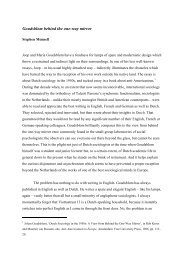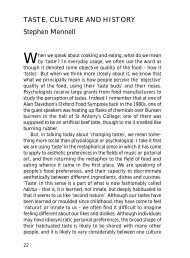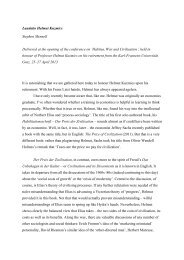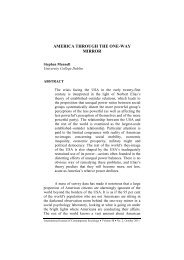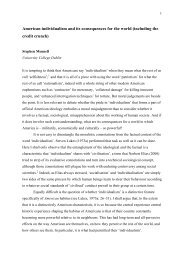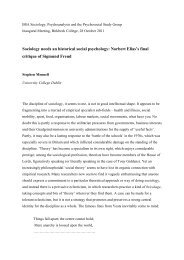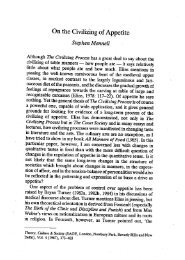Ethnomethodology and the New "Methodenstreit" - Stephen Mennell
Ethnomethodology and the New "Methodenstreit" - Stephen Mennell
Ethnomethodology and the New "Methodenstreit" - Stephen Mennell
You also want an ePaper? Increase the reach of your titles
YUMPU automatically turns print PDFs into web optimized ePapers that Google loves.
<strong>Ethnomethodology</strong> <strong>and</strong> <strong>the</strong> <strong>New</strong> "Methodenstreit"Author(s): <strong>Stephen</strong> <strong>Mennell</strong>Source: Acta Sociologica, Vol. 18, No. 4 (1975), pp. 287-302Published by: Sage Publications, Ltd.Stable URL: http://www.jstor.org/stable/4194078Accessed: 21/09/2010 15:27Your use of <strong>the</strong> JSTOR archive indicates your acceptance of JSTOR's Terms <strong>and</strong> Conditions of Use, available athttp://www.jstor.org/page/info/about/policies/terms.jsp. JSTOR's Terms <strong>and</strong> Conditions of Use provides, in part, that unlessyou have obtained prior permission, you may not download an entire issue of a journal or multiple copies of articles, <strong>and</strong> youmay use content in <strong>the</strong> JSTOR archive only for your personal, non-commercial use.Please contact <strong>the</strong> publisher regarding any fur<strong>the</strong>r use of this work. Publisher contact information may be obtained athttp://www.jstor.org/action/showPublisher?publisherCode=sageltd.Each copy of any part of a JSTOR transmission must contain <strong>the</strong> same copyright notice that appears on <strong>the</strong> screen or printedpage of such transmission.JSTOR is a not-for-profit service that helps scholars, researchers, <strong>and</strong> students discover, use, <strong>and</strong> build upon a wide range ofcontent in a trusted digital archive. We use information technology <strong>and</strong> tools to increase productivity <strong>and</strong> facilitate new formsof scholarship. For more information about JSTOR, please contact support@jstor.org.Sage Publications, Ltd. is collaborating with JSTOR to digitize, preserve <strong>and</strong> extend access to ActaSociologica.http://www.jstor.org
<strong>Ethnomethodology</strong> <strong>and</strong><strong>the</strong> new Methodemiret<strong>Stephen</strong> <strong>Mennell</strong>University of Exeter"But I've gotta use words whenI talk to you."T. S. Eliot, Sweeney Agonistes<strong>Ethnomethodology</strong> should not be mistaken for just one more varietyof microsociology. It is much more: it represents a comprehensive challengeto some of sociology's most general assumptions. In <strong>the</strong> past, <strong>the</strong>superficial similarity of <strong>the</strong> ethnomethodologists' interest in small scaleinteraction has led to comparisons with <strong>the</strong> work of Goffman <strong>and</strong> <strong>the</strong>symbolic interactionists (Gouldner 1971, Denzin 1971, Gidlow 1972),but ethnomethodologists have vehemently rejected such parallels (Douglas1971:21, Zimmerman <strong>and</strong> Wieder, 1971). The emergence of ethnomethodology,as both Bauman (1973b:31) <strong>and</strong> Goldthorpe (1973) recognize,represents a renewal of <strong>the</strong> Methodenstreit which flared inGerman sociology around <strong>the</strong> turn of <strong>the</strong> century. The ethnomethodologistsreject deductive explanation of <strong>the</strong> "covering law" kind in socialscience, emphasize <strong>the</strong> necessity of grasping <strong>the</strong> "meanings" which socialinteraction has for those participating in it, <strong>and</strong> are preoccupied with<strong>the</strong> uniqueness of every social situation.' Though recast in subtle forms,<strong>the</strong> old arguments for a rigid distinction between <strong>the</strong> natural <strong>and</strong> socialsciences are easily recognizable.The philosophical roots of ethnomethodology are two-fold. Ethnomethodologists<strong>the</strong>mselves most prominently claim intellectual ancestryfrom <strong>the</strong> social phenomenology of Alfred Schutz.2 Yet Schutz haso<strong>the</strong>r sociological followers - most notably Berger <strong>and</strong> Luckmann(1967) - whose work represents a much less drastic break with <strong>the</strong>interests of "conventional" sociology, <strong>and</strong> from whom ethnomethodologistsare at pains to emphasize <strong>the</strong>ir differences. What is really moredistinctive of ethnomethodology is its debt to Wittgensteinian "ordinarylanguage" philosophy. The nature of <strong>the</strong>se twin debts will beexamined below.Of ethnomethodology as a school of thought within sociology, HaroldGarfinkel is usually acknowledged to be <strong>the</strong> founder. Althoughethnomethodology did not attract very wide attention among sociologistsgenerally until a spate of publications by Garfinkel <strong>and</strong> his fol-i) <strong>Stephen</strong> <strong>Mennell</strong>, 1975* This essay is to appear in <strong>New</strong> Directions in Sociology, edited by D.C.Thorns, to be published by David <strong>and</strong> Charles, <strong>New</strong>ton Abbot, in 1976. 1should like to thank N. Abercrombie, J. H. Goldthorpe, members of <strong>the</strong>Sociology Department at Leicester University, <strong>and</strong> colleagues at Exeter for<strong>the</strong>ir comments on earlier versions of this paper.1 To speak of '<strong>the</strong>ethnomethodologists' asI do in this paper involvesa necessary oversimplification.Theyhave many differencesamong <strong>the</strong>mselves, <strong>and</strong>some writers often identifiedwith <strong>the</strong> school(Douglas for example)would not, or would nolonger, apply <strong>the</strong> labelto <strong>the</strong>mselves. AndSacks <strong>and</strong> his groupnow stress <strong>the</strong> 'scientific'character of <strong>the</strong>ir analyses.2 Hindness (1972) <strong>and</strong>Bauman (1973a) havecast doubt on whe<strong>the</strong>rSchutz's work representsan accurate interpretationof Husserl'sphenomenology.287
lowers appeared in <strong>the</strong> mid-1960's,3 Garfinkel himself (1968) hastraced its basic ideas back as far as 1945, when he was involved in astudy of how juries arrive at <strong>the</strong>ir decisions. The term "ethnomethodology"was invented much later as a conscious analogy with <strong>the</strong> terms"ethnoscience","ethnobotany", "ethnomedicine" <strong>and</strong> so on, as <strong>the</strong>y areused by anthropologists. It was meant to signify that just as nativeclassifications of plants or illnesses can be taken not as science but asdata to be analysed by <strong>the</strong> social scientist, so can <strong>the</strong> "methods" employedby participants in social situations.The substantive research carried out by ethnomethodologists <strong>and</strong><strong>the</strong>ir critique of "conventional"(or "absolutist" or "constructivist" or"positivist") sociology are closely related, but a few points can be madeabout <strong>the</strong>ir style of research. A feature of Garfinkel's early studies washis stratagem of disrupting familiar situations in order to expose <strong>the</strong>background assumptions <strong>and</strong> expectations, <strong>the</strong> stock of knowledge <strong>and</strong>"methods", which participants unconsciously deploy in <strong>the</strong>m."Procedurally it is my preference to start with familiar scenes<strong>and</strong> ask what can be done to make trouble. The operations thatone would have to perform, in order to multiply <strong>the</strong> senselessfeatures of perceived environments; to produce <strong>the</strong> sociallystructured affects of anxiety, shame, guilt, <strong>and</strong> indignation; <strong>and</strong>to produce disorganized interaction, should tell us somethingabout how <strong>the</strong> structures of everyday activities are ordinarily<strong>and</strong> routinely produced <strong>and</strong> maintained.... my studies are not properly speaking experimental. They aredemonstrations, designed... as 'aids to a sluggish imagination.'I have found that <strong>the</strong>y produce reflections through which <strong>the</strong>strangeness of an obstinately familiar world can be detected."(Garfinkel, 1967:37-38)3Volumes which haveattracted particularattention include Garfinkel(1967), Cicourel(1964, 1968), Douglas(1967), McHugh (1968),Sudnow (1967). Usefulcollections of shorterpapers by ethomethodologistsare Douglas,ed., (1971), Sudnow,ed. (1972) <strong>and</strong> Turner,ed. (1974). <strong>Ethnomethodology</strong>'seventualtransatlantic passage toBritain was marked by<strong>the</strong> appearance of Filmer,et al. (1972).A famous example was that in which students were asked to behaveas a lodger in <strong>the</strong>ir own homes (Garfinkel 1967:41-44), to <strong>the</strong> bewilderment<strong>and</strong> often anger of <strong>the</strong> rest of <strong>the</strong> family. Sudnow's PassingOn: The Social Organisation of Dying (1968) is an example of a largerscalestudy, involving <strong>the</strong> analysis (but not in this case <strong>the</strong> disruption)of <strong>the</strong> minutiae of interaction in hospital wards.More recently, two fairly distinct (though not mutually exclusive)trends have appeared in ethnomethodological investigations. One is <strong>the</strong>study of behaviour within organisational settings, especially organizationsdealing with people - as patients, as delinquents, as recipients ofwelfare payments <strong>and</strong> so on - focusing particularly on <strong>the</strong> way inwhich <strong>the</strong> clients are categorized <strong>and</strong> official records manipulated "forgood organizational reasons".' The second trend, in which HarveySacks is <strong>the</strong> outst<strong>and</strong>ing figure, has been towards <strong>the</strong> development ofa new kind of sociolinguistics - <strong>the</strong> analysis of actual tape-recordedconversations.5 The rationale for <strong>the</strong>se two tendencies is apparent in4 See Garfinkel, 'GoodOrganisational Reasonsfor "Bad" Clinic RRecords',(1967: 186-207),as well as Cicourel(1968), Zimmerman(1969).5 For examples of conversationalanalysis,see Sacks (1972a,1972b) <strong>and</strong> Schegloff<strong>and</strong> Sacks (1973).288
"accomplishments". As Zimmerman <strong>and</strong> Pollner (1971:82) express thisargument,"Sociology's acceptance of lay member's [sicl formulation of <strong>the</strong>formal <strong>and</strong> substantive features of sociology's topical concernsmakes sociology into an eminently folk discipline... Insofar as<strong>the</strong> social structures are treated as a given ra<strong>the</strong>r than as anaccomplishment, one is subscribing to a lay inquirer's version ofthose structures."To this extent, it is argued, "conventional" sociology is merely on a parwith any person's underst<strong>and</strong>ing of his everyday situation - a "firstdegree" corpus of knowledge "competitive" with everyday practicalknowledge.The thrust of this view can be seen in repeated criticisms of <strong>the</strong> useof official statistics in sociology (Cicourel 1968, Kitsuse <strong>and</strong> Cicourel1963, Douglas 1967). Douglas takes a case of classic concern to sociology,that of suicide rates, <strong>and</strong> argues that <strong>the</strong>y reflect <strong>the</strong> interpretationof deaths by coroners. Their judgments cannot be reduced merelyto a formal rule of categorization - <strong>the</strong> rules are always interpreted,<strong>and</strong> Douglas purports to show that <strong>the</strong> interpretations of differentcoroners are inconsistent with each o<strong>the</strong>r. Cicourel extends similarreasoning to <strong>the</strong> field of delinquency, showing how <strong>the</strong> unconsciousbackground assumptions of probation officers <strong>and</strong> police lead <strong>the</strong>m tofind delinquency where <strong>the</strong>y expect to find it <strong>and</strong> to be more ready tocategorize acts by certain types of people than o<strong>the</strong>rs as delinquent. Theconclusions are similar: aggregate statistics are meaningless, or at mostreflect only <strong>the</strong> operations of <strong>the</strong> official bureaucracy, because identical"real world events" may be placed in different categories, while quitedifferent events may be placed in one <strong>and</strong> <strong>the</strong> same category.Sociologists have no doubt frequently used official statistics too uncritically.As Hindess (1973) argues, it is disastrous to impose aliencategories <strong>and</strong> <strong>the</strong>n to reify <strong>the</strong> resulting statistics, as he shows to havehappened dramatically in <strong>the</strong> classification of <strong>the</strong> agrarian populationin <strong>the</strong> Indian Census of 1951. Categories are <strong>the</strong>oretical constructs, <strong>the</strong>choice of which must be justified as appropriate. Given this, however,a great deal can be done by <strong>the</strong> framing of detailed instructions <strong>and</strong>training of enumerators, interviewers <strong>and</strong> officials to minimise <strong>the</strong> inconsistentapplication of categories. But, as Hindess points out, <strong>the</strong>ethnomethodologists do not show much interest in <strong>the</strong> possibility ofestimating <strong>the</strong> degree of error present in statistics or in that of substantiallyimproving <strong>the</strong>m.Why <strong>the</strong>se possibilities do not interest <strong>the</strong>m may become a littleclearer in <strong>the</strong> light of Pollner's critique (1974) of Becker's version of<strong>the</strong> labelling <strong>the</strong>ory of social deviance. The <strong>the</strong>ory is summed up inBecker's statement that "The deviant is one to whom that label hassuccessfully been applied; deviant behaviour is behaviour that people290
so label" (Becker, 1963:9). Pollner, however, accuses Becker of not followingthis principle consistently, <strong>and</strong> <strong>the</strong>reby confusing <strong>the</strong> commonsenseactor's model of deviance with a sociological one. For <strong>the</strong> commonsenseactor, deviance is an objective quality of ano<strong>the</strong>r's action whichcauses <strong>and</strong> justifies an appropriate reaction to it by <strong>the</strong> community.On <strong>the</strong> o<strong>the</strong>r h<strong>and</strong>, Pollner writes, "Viewed sociologically, <strong>the</strong> deviantcharacter of <strong>the</strong> act is not intrinsic to <strong>the</strong> act but depends upon or,more emphatically, is constituted by <strong>the</strong> subsequent response of <strong>the</strong>community" (1974:29, my italics). Becker employs both of <strong>the</strong>se perspectivesto produce his cross-classification of types of deviant (Fig. 1).Pollner, on <strong>the</strong> o<strong>the</strong>r h<strong>and</strong>, draws on his study of an American trafficcourt - where, as he points out, many of <strong>the</strong> convicted feel aggrievedbecause <strong>the</strong>ir common-sense knowledge tells <strong>the</strong>m that <strong>the</strong> same offenceis continually being committed without <strong>the</strong> offenders being apprehended.Obedient BehaviourRule-breakingBehaviourPerceived as deviant Falsely Accused Pure DeviantNot Perceived as deviant Conforming Secret DeviantFigure 1. Types of Deviant Behaviour (Becker, 1963: 20).... not all those who violate rules are categorised as deviant <strong>and</strong>not all those who are categorised as deviant have violated arule. Presumably (i.e. in perfect conformity with <strong>the</strong> criterionof rule violation), if all <strong>the</strong> faults of police <strong>and</strong> judicial processingwere removed so as to provide for homogeneous categories,<strong>the</strong>n labelling would be superfluous. Rule violation <strong>and</strong>application of <strong>the</strong> label 'deviant' would coincide <strong>and</strong> <strong>the</strong> deviantwould in effect be he who has violated a rule <strong>and</strong> onlyincidentally he who has been labelled deviant." (Pollner, 1974:3)Since this condition is not met, Pollner rejects <strong>the</strong> idea of "real deviance"as a matter of no relevance for sociologists, as being in effect an unknowableDing an Sich. Becker's classification is just <strong>the</strong> same as thatemployed by judges (who for this purpose count as laymen using commonsensepractical reasoning): "conforming" <strong>and</strong> "pure deviant" behaviourcorrespond to a just acquittal <strong>and</strong> a just conviction.The deeper roots of <strong>the</strong> ethnomethodologists' critique of "conventional"sociology lie in <strong>the</strong>ir views on <strong>the</strong> nature of social interaction<strong>and</strong> <strong>the</strong> use of language within it. Underlying most sociology <strong>the</strong>y seewhat Wilson (1971) calls "<strong>the</strong> normative paradigm". This involves tworelated ideas, that interaction is rule-governed, <strong>and</strong> that deductiveexplanation is appropriate to sociology. Deductive explanation involveslogically deducing <strong>the</strong> facts to be explained from a number of <strong>the</strong>e-291
etical premisses <strong>and</strong> given empirical conditions. This necessitates that"each description entering into deductive explanation must be treated ashaving a stable meaning that is independent of <strong>the</strong> circumstances inwhich it is produced" (Wilson 1971:71). For this to be true in <strong>the</strong>explanation of social interaction, behaviour has to be seen as governedby rules, which Wilson defines as "a stable linkage between <strong>the</strong> situationof an actor <strong>and</strong> his action in that situation" (1971:60). What thisreally amounts to, he contends, is that in order to treat various instancesas examples of <strong>the</strong> same category of social situation, sociologistshave to assume a degree of "cognitive consensus" - to assume thatactors agree in recognizing situations at different times <strong>and</strong> in differentplaces as being instances of "<strong>the</strong> same kind" of situation, <strong>and</strong> <strong>the</strong>reforebehave similarly.In contrast, underlying <strong>the</strong> work of phenomenological sociologists is"<strong>the</strong> principle of <strong>the</strong> contextual determination of meaning" (Douglas,1971:37). Of course, "conventional" sociologists recognize that <strong>the</strong> sameitem of behaviour (a lie, for instance) can have different meanings indifferent contexts. Ethnomethodologists, however, take an unusuallyradical view of <strong>the</strong> interpretative nature of <strong>the</strong> process of social interaction.They see actors as continually groping towards a definition of<strong>the</strong> situation at h<strong>and</strong>, <strong>and</strong> situations are subject to continuous redefinition.In particular, all conversations contain numerous expressionswhich are not explicitly defined in a particular situation, <strong>and</strong> participantshave to achieve "operational" or working definitions of all such"indexical" expressions which are valid only in <strong>the</strong> situation at h<strong>and</strong>."Indexicality" is a key term in ethnomethodology. It is taken from<strong>the</strong> work of <strong>the</strong> logician Bar-Hillel (1954), "who defines an indexicalexpression as one that depends for its meaning on <strong>the</strong> context in whichit is produced" (Wilson, 1971 :68fn.). Bar-Hillel gives as examples ofindexical expressions <strong>the</strong> statements "It's raining" <strong>and</strong> "I'm hungry", ascontrasted with a non-indexical statement such as "Ice floats on water"which has universal validity. Abercrombie (1974) has pointed out thatBar-Hillel argues only that indexical expressions depend for <strong>the</strong>irreference, not <strong>the</strong>ir general meaning, on <strong>the</strong> context in which <strong>the</strong>y areproduoed, <strong>and</strong> that this argument does not justify <strong>the</strong> much strongerprinciple of <strong>the</strong> contextual determination of meaning. The meaning immediatelybecomes clear when <strong>the</strong> reference is made evident. Garfinkel(1967:25-26, 38ff), on <strong>the</strong> o<strong>the</strong>r h<strong>and</strong>, illustrates his view of indexicalitywith an excerpt from a highly elliptical conversation betweena husb<strong>and</strong> <strong>and</strong> wife, toge<strong>the</strong>r with <strong>the</strong>ir much longer expansion neededto make it intelligible to an outside observer. Yet "conventional" sociologistsremain unconvinced that this is a matter of vast importance.They take it as a commonplace that people in close relationships anticipatea large stock of relevant knowledge on <strong>the</strong> part of <strong>the</strong> o<strong>the</strong>r,making possible elliptical conversation, but that participants could explain<strong>the</strong> reference of <strong>the</strong>ir conversation to an outside observer if292
necessary <strong>and</strong> <strong>the</strong>reby make its meaning manifest, <strong>and</strong> that this is sufficientfor purposes of sociology.None<strong>the</strong>less, <strong>the</strong> ethnomethodologists st<strong>and</strong> by <strong>the</strong>ir view that meaningis utterly dependent on unique situational contexts."It is apparent that in <strong>the</strong> interpretive [sic] view of social interaction,in contrast with <strong>the</strong> normative paradigm, definitions ofsituations <strong>and</strong> actions are not explicitly or implicitly assumedto be settled once <strong>and</strong> for all by literal application of a preexisting,culturally established system of symbols. Ra<strong>the</strong>r, <strong>the</strong>meanings of situations <strong>and</strong> actions are interpretations formulatedon particular occasions by <strong>the</strong> participants in <strong>the</strong> interaction<strong>and</strong> are subject to reformulation on subsequent occasions."(Wilson, 1971:69)Similarly, Zimmerman <strong>and</strong> Pollner (1971: 97) argue that <strong>the</strong> featuresof social situations are "unique to <strong>the</strong> particular settings" <strong>and</strong> <strong>the</strong>refore"may not be generalised by <strong>the</strong> analyst to o<strong>the</strong>r settings". That <strong>the</strong> newMethodenstreit is but <strong>the</strong> old reborn is here very evident. Bauman(1973b: 34) succinctly comments that those who argue for <strong>the</strong> uniquenessof socio-cultural events are"convinced that <strong>the</strong> uniqueness of what <strong>the</strong>y see <strong>and</strong> describeis an attribute of <strong>the</strong> phenomenon described <strong>and</strong> not of <strong>the</strong> verylow level of particularity <strong>the</strong>y have deliberately chosen or unknowinglyinherited."But given <strong>the</strong>ir insistence on <strong>the</strong> 'irremediability' of indexicality, <strong>the</strong>yconsider <strong>the</strong> interpretative view of social interaction incompatible with<strong>the</strong> logic of deductive explanation. McHugh et al. (1974: 3) go so faras to say that "Speech never 'solves' this problem, if by solve is meantto remedy, because any imaginable solution (any new speech) is itselfa new version of <strong>the</strong> same old problem". Chacun a son solipsisme. It isdifficult to see how this extreme position is compatible with Schutz'sviews on <strong>the</strong> use of second degree constructs.<strong>Ethnomethodology</strong> <strong>and</strong> SchutzSince ethnomethodology st<strong>and</strong>s in opposition not only to "conventional"sociology but also to <strong>the</strong> work of o<strong>the</strong>r sociological followers ofAlfred Schutz, I want to draw attention to an ambiguity in Schutz'swork <strong>and</strong> to <strong>the</strong> ethnomethodologists' interpretation of it.In a generally very clear statement of his position (1962: 48-66),Schutz spelled out <strong>the</strong> points on which he was in agreement with ErnestNagel, who may be taken as representative of all that ethnomethodologistsdislike in <strong>the</strong> logical positivist philosophy of science."I agree with Professor Nagel that all empirical knowledge involvesdiscovery through processes of controlled inference, <strong>and</strong>293
that it must be stateable in propositional form <strong>and</strong> capable ofbeing verified by anyone who is prepared to make <strong>the</strong> effort todo so through observation - although I do not believe as ProfessorNagel does, that this observation has to be sensory in <strong>the</strong>precise meaning of this term [i.e. Schutz rejects behaviourism -SJMI. Moreover, I agree with him that '<strong>the</strong>ory' means in allempirical sciences <strong>the</strong> explicit formulation of determinate relationsbetween a set of variables in terms of which a fairly extensiveclass of empirically ascertainable regularities can be explained.Fur<strong>the</strong>rmore, I agree wholeheartedly with his statementthat nei<strong>the</strong>r <strong>the</strong> fact that <strong>the</strong>se regularities have in <strong>the</strong>social sciences a ra<strong>the</strong>r narrowly restricted universality, nor <strong>the</strong>fact that <strong>the</strong>y permit prediction only to a ra<strong>the</strong>r limited extent,constitutes a basic difference between <strong>the</strong> social <strong>and</strong> naturalsciences, since many branches of <strong>the</strong> latter show <strong>the</strong> same features."(1962: 51)Schutz, <strong>the</strong>n, clearly embraces <strong>the</strong> deductive mode of explanation for<strong>the</strong> social sciences. Of course, he goes on to argue (convincingly, Ithink) that Nagel misunderst<strong>and</strong>s <strong>the</strong> nature of Verstehen. He explainsthat it has nothing to do with introspection but, just like commonsenseexperience of <strong>the</strong> everyday world, is a result of processes of learning<strong>and</strong> acculturation. And Verstehen is "by no means a private affair of<strong>the</strong> observer which cannot be controlled by <strong>the</strong> experience of o<strong>the</strong>robservers" (1962: 56). So Schutz here endorses <strong>the</strong> assumption of a degreeof cognitive consensus rejected by Wilson.In <strong>the</strong> same paper, Schutz proceeds to reiterate his familiar pointthat because social reality already has meaning for people living withinit, <strong>the</strong> social scientist must work with constructs founded upon <strong>the</strong>everyday constructs of <strong>the</strong> daily world. This notion of constructs of <strong>the</strong>second degree is <strong>the</strong> source of great difficulty. For one thing, it is notentirely clear whe<strong>the</strong>r Schutz thought that all or only some of oursociological constructs must be second order. The ethnomethodologistscertainly believe that all of <strong>the</strong>m must be. On <strong>the</strong> o<strong>the</strong>r h<strong>and</strong>, Schutzremarks at one point that "all scientific explanations of <strong>the</strong> socialworld can, <strong>and</strong> for certain purposes must, refer to <strong>the</strong> subjective meaningof <strong>the</strong> actions of human beings from which social reality originates"(1962: 62, my italics). This seems to imply that Schutz would agreewith Gellner (1960) that, for example, "to underst<strong>and</strong> <strong>the</strong> class structureof a society one must not only know what rank, etc., mean in it,but also how many people occupy each grade, <strong>and</strong> this is a matter ofcounting, not underst<strong>and</strong>ing".6 We have already noted <strong>the</strong> othnoniethodologists'objections to counting.More importantly, Schutz repeatedly argued that "constructs of <strong>the</strong>second degree" must conform to <strong>the</strong> "postulate of logical consistency",but also to <strong>the</strong> "postulate of adequacy". By <strong>the</strong> latter he meant:294* Bryant (1970) elaboratesGellner's point<strong>and</strong>, significantly, isattacked by Walsh (inFilmer et al. 1972:41 ff.).
"that each term in such a scientific model of human action mustbe constructed in such a way that a human act performed within<strong>the</strong> real world by an individual actor as indicated by <strong>the</strong> typicalconstruct would be underst<strong>and</strong>able to <strong>the</strong> actor himself as wellas to his fellow men in terms of commonsense interpretation ofeveryday life." (1962: 64)But this statement is deeply ambiguous. If Schutz means only that socialscientists' <strong>the</strong>ories must be able logically to subsume <strong>the</strong> practical"recipes" of commonsense, <strong>and</strong> so to relate generalising propositions todescriptions of how actual people behave in actual situations, <strong>the</strong>n thisis nothing exceptionable. On <strong>the</strong> o<strong>the</strong>r h<strong>and</strong>,"if wha-t he means entails that <strong>the</strong> commonsense view of <strong>the</strong> socialworld must be immune from correction <strong>and</strong> modification by<strong>the</strong> discoveries of social science, <strong>the</strong>n what he asserts is not onlyfalse but deprives <strong>the</strong> social sciences of part of <strong>the</strong>ir genuineimportance. Our commonsense beliefs about society are not onlyoften false, but are also sometimes incorrigible at <strong>the</strong> level ofcomnmonsense." (Emmet <strong>and</strong> Maclntyre, 1970: xiv.)The ethnomethodologists seem clearly to opt for <strong>the</strong> second of<strong>the</strong>se two interpretations. This is <strong>the</strong> burden of <strong>the</strong>ir criticisms that"conventional" sociology is merely a first degree of "folk" sociology,<strong>and</strong> that its vocabularies <strong>and</strong> <strong>the</strong>ories seek "to remedy <strong>the</strong> indexicalproperties of members talk <strong>and</strong> conduct" (Garfinkel, 1967: 11). On <strong>the</strong>o<strong>the</strong>r h<strong>and</strong>, I believe <strong>the</strong>re is evidence that Schutz intended his remarksin <strong>the</strong> countrary sense. First, he often referred to "sets of motives, goals<strong>and</strong> roles" (1962: 64) as examples of valid second degree constructs -<strong>and</strong> <strong>the</strong>se are precisely <strong>the</strong> kinds of concepts distrusted by ethnomethodologists(see for example McHugh et al., 1974: 21-46, Cicourel,1970). Second, in both his early <strong>and</strong> late work (1972: 244-46, 1962:64-65), he spoke appreciatively of <strong>the</strong> progress of economic <strong>the</strong>ory -for example, models of perfect <strong>and</strong> monopolistic competition - whichclaims great generality <strong>and</strong> is poles apart from <strong>the</strong> ethnomethodologicalstyle of investigation. Third, in his comments on Nagel at least, hemakes it clear that his quibble is not so much with how social scientistshave in <strong>the</strong> main done social science (though of course he had specificcriticisms), but with Nagel's way of representing that procedure.It is true that elsewhere Schutz can be read to give more support to<strong>the</strong> ethnomethodological position. For instance, in a paper (1964:64-88) taken by Garfinkel as <strong>the</strong> basis for <strong>the</strong> influential last chapterof Studies in <strong>Ethnomethodology</strong>, Schutz was at pains to emphasize thatwe should not speak simply of a concept or ideal-type, but must specify<strong>the</strong> problem for which it has been constructed. Here Schutz is essentiallycriticising what Helmut Wagner (1964) was later to caU <strong>the</strong> "fallacyof <strong>the</strong> displacement of scope" (of concepts <strong>and</strong> <strong>the</strong>ories from <strong>the</strong>ir295
micro- or macro-level of origin to <strong>the</strong> o<strong>the</strong>r) but ra<strong>the</strong>r broadens <strong>the</strong>issue. Somewhat Delphically he says, "To be sure it must be admittedthat <strong>the</strong> term 'level' applies strictly only to whole systems of problems;never<strong>the</strong>less, <strong>the</strong> consequences are, in principle, <strong>the</strong> same." However,Schutz's conclusions are broadly <strong>the</strong> same as in <strong>the</strong> paper previouslymentioned. He admits that a great part of social science can beperformed "at a level which legitimately abstracts from all that happensin <strong>the</strong> individual actor" (1964: 84-85), though he regards it as akind of intellectual shorth<strong>and</strong>. Where "real scientific work" is done,however, <strong>the</strong> scientist will always have <strong>the</strong> option of shifting to <strong>the</strong>level of <strong>the</strong> individual actor. This condition is clearly met in even soapparently "abstract" <strong>and</strong> generalising a branch of social science asmacroeconomic <strong>the</strong>ory, <strong>and</strong> it is all that is required to meet <strong>the</strong> postulateof adequacy.On <strong>the</strong> whole, although Schutz undoubtedly presents problems ofinterpretation, it seems to me that writers like Berger <strong>and</strong> Luckmannare more closely his followers that are <strong>the</strong> ethnomethodologists. Inpractice, <strong>the</strong> ethnomethodologists' criticisms of "conventional" sociologyseem to be supported by appeals to certain arguments of Wittgensteinianphilosophers.Ethnometodology <strong>and</strong> <strong>the</strong> WittgensteiniansIn its modern form, <strong>the</strong> case against generalising, deductive explanationin social science has repeatedly been stated by Wittgensteinianphilosophers, <strong>and</strong> <strong>the</strong> ethnomethodologists often appeal to <strong>the</strong> writingsof philosophers such as Winch (1958, 1964), Louch (1966) <strong>and</strong> Austin( 961, 1965) to support <strong>the</strong>ir own arguments.Winch's basic argument is that <strong>the</strong> reasons people give for <strong>the</strong>iractions, <strong>the</strong>ir explanations of <strong>the</strong>ir motivation, cannot be taken as <strong>the</strong>causes of those actions, because <strong>the</strong> relationship between a reason <strong>and</strong>an action is internal <strong>and</strong> logical, not external <strong>and</strong> contingent. Reasonsare not <strong>the</strong>refore anything distinct from <strong>the</strong>ir supposed effects. Thisview is echoed loudly in <strong>the</strong> work of McHugh et al. (1974: 27-28).They see "motive" as a commonsense formulation, <strong>the</strong> acceptance ofwhich by sociologists contributes to sociology's status as a "folk discipline".They claim that <strong>the</strong> "conventional" sociologist "still conceives ofmotive as a practical actor's concrete report of his state of mind: heonly shifts his focus from <strong>the</strong> state of mind to <strong>the</strong> talk, by treating <strong>the</strong>talk as some sort of public indicator of <strong>the</strong> mind" (1974: 3). McHughet al. conceive of reasons as <strong>the</strong> "ad hoc reconstruction of <strong>the</strong> concretepractice of following a rule" (1974: 86). Again, this rests on <strong>the</strong> viewthat rules, always having to be re-interpreted in every new situation,cannot give any clear guidance to action. Reasons, in fact, are seen aspost facto justification for actions, <strong>and</strong> bear no relation to what brought<strong>the</strong>m about. "It is something like a logician who wants to do a formalproof. The rules of logic do not provide a correct answer, <strong>the</strong>y provide296
But this clarity is precisely what is denied by "linguistic" philosophers,who strenuously emphasise complexity, variegation, blurred boundaries<strong>and</strong> transitions between concepts. Put more precisely:"The 'polymorphus' diagnosis offered of this situation byLinguistic Philosophy runs as follows: a term may very wellapply to a whole class of objects A, B, C etc., in such a way thatA does have something in common with B, <strong>and</strong> B with C, butnot necessarily A with C. There may, as it is put, be a 'familylikeness' such as occurs when a member of a family is recognizablyone of it, yet no two members need have any features incommon." (Gellner, 1968: 49)This is <strong>the</strong> classic Wittgensteinian idea of "family likeness", <strong>and</strong> somethingvery close to <strong>the</strong> principle of polymorphism is clearly a key partof <strong>the</strong> ethnomethodologists' case. So far as I can trace, only Coulter(1973) has actually used <strong>the</strong> word polymorphism, but <strong>the</strong> principle isperfectly evident in ethnomethodological criticisms of official statistics<strong>and</strong> discussions of indexicality. Obviously it would be -futile to denythat <strong>the</strong>re are imperfections both in social statistics <strong>and</strong> in sociologicalvocabulary (consider <strong>the</strong> term "role", or <strong>the</strong> Minoan labyrinth of terminologyused in <strong>the</strong> study of social stratification). Sociologists neednot deny it, so long as <strong>the</strong>y remain convinced, as <strong>the</strong> ethnomethodologistsare not, that in social science, just as in natural science, progress isalways possible through <strong>the</strong> process of criticism towards greater consistency,coherence <strong>and</strong> clarity.But a second pillar of "linguistic" philosophy identified by Gellneris <strong>the</strong> "Argument from <strong>the</strong> Paradigm Case" (APC for short). This is<strong>the</strong> argument that words mean what <strong>the</strong>y are used to mean. If we denythat a word means what it is customarily said to mean, we must ei<strong>the</strong>rbe ignorant of <strong>the</strong> language, or be intent upon reforming or correctingit. Both <strong>the</strong> "linguistic" philosophers <strong>and</strong> (as we have seen in <strong>the</strong>ir viewson <strong>the</strong> "irremediability of indexicality") <strong>the</strong> ethnomethodologists claimthis is absurd. The ethnomethodological variant of <strong>the</strong> APC can beseen in this passage from Garfinkel:298"Characteristically, formal investigations have been concernedei<strong>the</strong>r with devising normative <strong>the</strong>ories of symbolic usages, orwhile seeking descriptive <strong>the</strong>ories, have settled for normativeones. In ei<strong>the</strong>r case it is necessary to instruct <strong>the</strong> construingmember to act in accordance with <strong>the</strong> investigator's instructionsin order to guarantee that <strong>the</strong> investigator will be able to study<strong>the</strong>ir usages as instances of <strong>the</strong> usages <strong>the</strong> investigator has inmind. But following Wittgenstein, person's [sic] actual usages arerational usages in some 'language game'. What is <strong>the</strong>ir game?As long as this programmatic question is neglected, it is in-
charge that sociology is a "folk discipline" is correct. To admit this,however, <strong>the</strong>y allege,assumes sociology to be a disciplined investigation that isfully competitive with members' relaxed investigation.... Such anassumption leaves unexplicated members' methods for analysing,accounting, factfinding, <strong>and</strong> so on, which produce for sociologyits field of data." (Zimmerman <strong>and</strong> Pollner, 1971: 83)The latter conclusion is, I think, untrue. There seems little reason why<strong>the</strong> new interests in linguistic behaviour <strong>and</strong> what might be ca}led <strong>the</strong>"ultra-micro-analysis" of social interaction cannot be h<strong>and</strong>led withino<strong>the</strong>r epistemologies, <strong>and</strong> indeed Sacks <strong>and</strong> his colleagues (Sacks 1972a,1972b, Schegloff <strong>and</strong> Sacks, 1973) have already produced generalisationsfrom conversational analysis which seem quite capable of beingabsorbed into orthodox sociology.Ethnomethodologists often approvingly quote W. I. Thomas's famousdictum that "if men define situations as real, <strong>the</strong>y are real in <strong>the</strong>ir consequences".But <strong>the</strong>y have a strong tendency to abbreviate it in effectto "if men define situations as real, <strong>the</strong>y are real". That social realitymust remain akin to <strong>the</strong> shadows of <strong>the</strong> prisoners in Plato's cave seemsto me to be <strong>the</strong> drift of, for example, Poliner's criticism of Becker,mentioned above. Such a view seems to me to st<strong>and</strong> in <strong>the</strong> way of asking<strong>the</strong> questions of most interest to both sociologists <strong>and</strong> laymen. ForThomas's dictum in its untruncated version leads to <strong>the</strong> study of <strong>the</strong>unintended consequences of social actions,' which is <strong>the</strong> very basis ofsociology's interest <strong>and</strong> importance. And this stems precisely form <strong>the</strong>construction of sociological <strong>the</strong>ories combining propositions about participants'perceptions of <strong>the</strong> situation with propositions contributed bysociologists about <strong>the</strong> dynamics of <strong>the</strong> wider structures in which participantsare enmeshed but can only partially or inaccurately perceivefrom <strong>the</strong>ir individual vantage points.BibliographyAbercrombie, Nicholas, 1974. Sociological Indexicality, Journal for <strong>the</strong>Theory of Social Behaviour, 4, 1, 89-95.Austin, J. L. 1961. Philosophical Papers, London, Oxford University Press.Austin, J. L., 1965. How to do things with Words, London, Oxford UniversityPress.Bar-Hillel, Y., 1954. Indexical Expressions, Mind, 63, 251, 359-79.Bauman, Z. A., 1973a. On <strong>the</strong> Philosophical Status of <strong>Ethnomethodology</strong>,Sociological Review, NS, 21, 1, 5-23.Bauman, Z. A., 1973b. Culture as Praxis, London, Routledge <strong>and</strong> KeganPaul.Becker, Howard S., 1963. Outsiders, <strong>New</strong> York, Free Press.Berger, Peter, <strong>and</strong> Thomas Luckmann, 1967. The Social Construction ofReality, London, Allen Lane.Bryant, C. A. G., 1970. In Defence of Sociology, British Journal of Sociology,21, 1, 95-107.* Merton (1968: 475-90) takes Thomas's dictumas <strong>the</strong> point ofdeparture for his classicdiscussion of <strong>the</strong> 'selffulfilling(<strong>and</strong> selfcontradicting)prophecy'.But <strong>the</strong> idea ofunintended consequencesof socal action canbe interpreted muchmore broadly (see<strong>Mennell</strong> 1974: 168-171) so that investigating<strong>the</strong>m is arguablysociology's very raisond'etre.300
Cicourel, Aaron V., 1964. Method <strong>and</strong> Measurement in Sociology, <strong>New</strong>York, Free Press.Cicourel, Aaron V., 1968. The Social Organisation of Juvenile Justice, <strong>New</strong>York, Wiley.Cicourel, Aaron V., 1970. Basic <strong>and</strong> Normative Rules in <strong>the</strong> Negotiation ofStatus <strong>and</strong> Role, in H. P. Dreitzel, ed., Recent Sociology No. 2, <strong>New</strong> York,Collier-Macmillan, 1970. (Reprinted in D. Sudnow, ed., Studies in SocialInteraotion, <strong>New</strong> York, Free Press, 1972)Coulter, J., 1973. Language <strong>and</strong> <strong>the</strong> Conceptualisation of Meaning, Sociology,7, 2, 173-189.Day, W. F., 1969a. Radical Behaviourism in Reconciliation with Phenomenology,Journal of <strong>the</strong> Experimental Analysis of Behaviour, 12, 2, 315-328.Day, W. F., 1969b. On Certain Similarities between <strong>the</strong> Philosophical Investigationsof Ludwig Wittgenstein <strong>and</strong> <strong>the</strong> Operationism of B. F. Skinner,Journal of <strong>the</strong> Experimental Analysis of Behaviour, 12, 3, 489-506.Denzin, Norman K., 1969. Symbolic Interactionism <strong>and</strong> <strong>Ethnomethodology</strong>:A Proposed Syn<strong>the</strong>sis, American Sociological Review, 34, 6, 922-934.Douglas, Jack D., 1967. The Social Meanings of Suicide, Princeton, N.J.,Princeton University Press.Douglas, Jack D., ed., 1971. Underst<strong>and</strong>ing Everyday Life, London, Routledge<strong>and</strong> Kegan Paul.Emmet, D., <strong>and</strong> A. C. Maclntyre, eds., 1970. Sociological Theory <strong>and</strong>Philosophical Analysis, London, Macmillan.Filmer, P., M. Phitlipson, D. Silverman, <strong>and</strong> D. Walsh, 1972. <strong>New</strong> Directionsin Sociological Theory, London, Collier-Macmillan.Garfinkel, Harold, 1967. Studies in <strong>Ethnomethodology</strong>, Englewood Cliffs,N..J, Prentice-Hall.Garfinkel, Harold, 1968. The Origins of <strong>the</strong> term '<strong>Ethnomethodology</strong>', inR. J. Hill <strong>and</strong> K. S. Crittenden, eds., Proceedings of <strong>the</strong> Purdue Symposiumon <strong>Ethnomethodology</strong>, Institute Monograph Series No. 1, Institutefor <strong>the</strong> Study of Social Change, Purdue University, 1968.Geliner, Ernest, 1960. Review of Peter Winch, The Idea of a Social Science,British Journal of Sociology, 11, 2, 170-72.Gellner, Ernest, 1968 (orig. 1959). Words <strong>and</strong> Things, Harmondsworth, PenguinBooks.Gidlow, Bob, 1972. <strong>Ethnomethodology</strong> - <strong>New</strong> Name for Old Practices,British Journal of Sociology, 23, 4, 395-405.Goldthorpe, John H., 1973. A Revolution in Sociology?, Sociology, 7, 3,449-62.Gouldner, Alvin W., 1971, The Cominig Crisis of Western Sociology, London,Heinemann.Hindess, Barry, 1972. The 'Phenomenological' Sociology of Alfred Schutz,Econtomy <strong>and</strong> Society 1, 1, 1-27.Hindess, Barry, 1973. The Use of Official Statistics in Sociology: A Critiqueof Positivism <strong>and</strong> <strong>Ethnomethodology</strong>, London, Macmillan.Kitsuse, J. <strong>and</strong> A. V. Cicourel, 1963. A Note on <strong>the</strong> Uses of Official Statistics,Social Problems, 11.Louch, A. R., 1966. Explaniation <strong>and</strong> Humnan Action, Oxford: Basil Blackwell.McHugh, Peter, 1968. Defining <strong>the</strong> Situation, Indianapolis, Bobbs-Merrill.McHugh, Peter, S. Raffel, D. C. Foss, <strong>and</strong> A. F. Blum, 1974. On <strong>the</strong> Beginningof Social Inquiry, London, Routledge <strong>and</strong> Kegan Paul.<strong>Mennell</strong>, <strong>Stephen</strong> J., 1974. Sociological Theory: Uses <strong>and</strong> Unities, London,Thomas Nelson.Merton, Robert K., 1968. Social Theory <strong>and</strong> Social Structure, enlarged edition,<strong>New</strong> York, Free Press.Poliner, Melvin, 1974. Sociological <strong>and</strong> Common-sense Models of <strong>the</strong> LabellingProcess, in Roy Turner, ed., <strong>Ethnomethodology</strong>, Harmondsworth,Penguin Books, pp. 27-40.2301
Popper, Sir Karl, 1972. Objeotive Knowledge, Oxford, Oxford UniversityPress.Sacks, Harvey, 1972a. An Initial Investigation of <strong>the</strong> Usability of ConversationalData for Doing Sociology, in D. Sudnow, ed., Studies inSocial Interaction, <strong>New</strong> York, Free Press.Sacks, Harvey, 1972b. On <strong>the</strong> Analysability of Stories by Children, in J. J.Gumperz <strong>and</strong> Dell Hymes, ed., Directions in Sociolinguistics: The Ethnographyof Communication, <strong>New</strong> York, Holt, Rinehart <strong>and</strong> Winston. (Reprintedin Roy Tuner, ed., <strong>Ethnomethodology</strong>, Harniondsworth, PenguinBooks, 1974, pp. 216-232.)Schegloff, Emmanuel, <strong>and</strong> Harvey Sacks, 1975. Opening Up Closings,Semiotica, 8, 289-327. (Reprinted in Roy Turner, ed., Ethomethodology,Harmondsworth, Penguin Books, 1974, pp. 233-264.)Schutz, Alfred, 1962, Collected Papers, 1, The Problem of Social Reality,The Hague; Martinus Nijhoff.Schutz, Alfred, 1964. Collected Papers, II, Studies in Social Theory, TheHague, Martinus Nijhoff.Schutz, Alfred, 1972 (orig. 1932). The Phenomenology of <strong>the</strong> Social World,London, Heinemann.Skinner, B. F., 1957. Verbal Behaviour, <strong>New</strong> York, Appleton-Century-Crofts.Sudnow, David, 1968. Passing On: The Social Organisation of Dying, EnglewoodCliffs, N.J., Prentice-Hall.Sudnow, David, ed., 1972. Studies in Social Interaction, <strong>New</strong> York, FreePress.Turner, Roy, ed., 1974. <strong>Ethnomethodology</strong>, Harmnondsworth, Penguin Books.Wagner, Helmut, R., 1964. Displacement of Scope: a problem of <strong>the</strong> relationshipbetween small-scale <strong>and</strong> large-scale sociological <strong>the</strong>ories, AmericanJournal of Sociology, 69, 6, 511-584.Wilson, Thomas P., 1971. Normative <strong>and</strong> Interpretive Paradigms in Sociology,in J. D. Douglas, ed., Underst<strong>and</strong>ing Everyday Life, London, Routledge<strong>and</strong> Kegan Paul, pp. 57-79.Winch, Peter, 1958. The Idea of a Social Science, London, Routledge <strong>and</strong>Kegan Paul.Winch, Peter, 1964. Underst<strong>and</strong>ing a Primitive Society, American PhilosophicalQuarterly, 1, 4, 307-324.302



